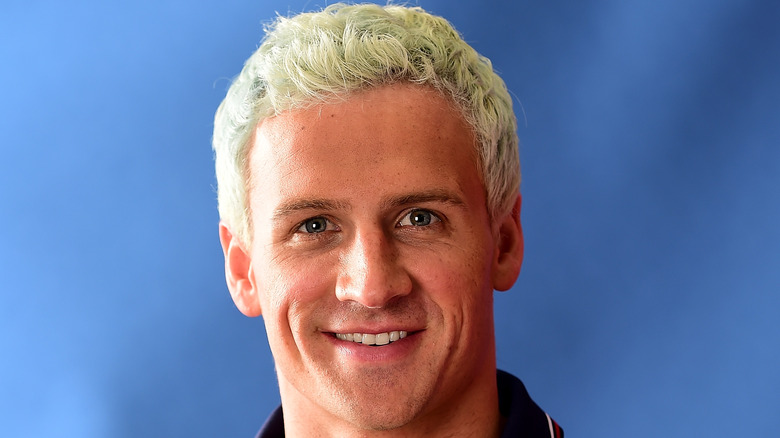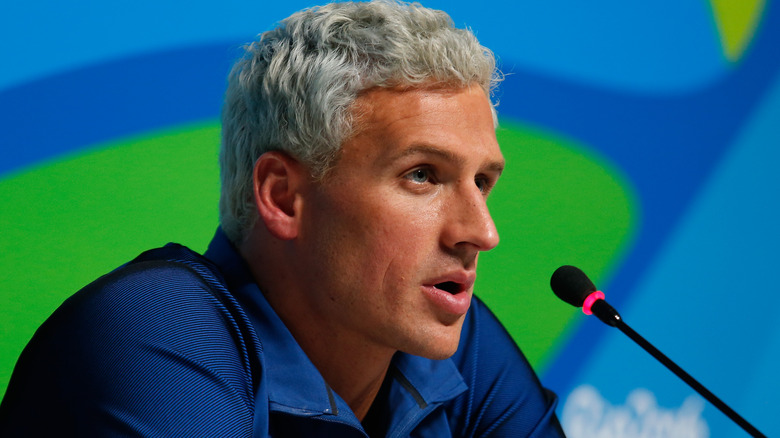Inside The U.S. Swim Team Controversy At The 2016 Olympics
For many a sports fan who heard of what apparently happened in Rio de Janeiro on Sunday, August 14, 2016, it was a huge shock. As reported by The New York Times and other publications, U.S. Olympic swimmers Ryan Lochte, Gunnar Bentz, Jack Conger, and Jimmy Feigen claimed to have been robbed at gunpoint early that morning, after they left a birthday party for a fellow athlete. This was a major cause for concern, given how crime was a serious problem in Rio in the lead-up to the 2016 Olympics. There were also a number of muggings and robberies that took place in the days prior, though none as shocking as the one involving the U.S. swimmers. Lochte, after all, was arguably Team USA's second highest-profile swimmer behind Michael Phelps, and his "Jeah" catchphrase (via ESPN) and, how shall we put it, colorful personality made him a bit of a pop-culture mainstay.
When everything was said and done, "Lochtegate" became a buzzword in the world of sports, all of the four aforementioned swimmers — especially Lochte — were disgraced, and what was originally thought to be a traumatizing incident had turned into one of the most shameful sports scandals of the 2010s. Here's the truth behind the U.S. swim team's controversy at the 2016 Rio Games, starting with the initial comments from Lochte that detailed what purportedly took place on that fateful Sunday morning.
Lochte details the robbery to Billy Bush amid conflicting reports
According to The New York Times, the party that Ryan Lochte and his fellow U.S. swimmers attended started at 11:30 p.m. on Saturday, August 13, 2016, and lasted until 5 a.m. the following morning, with the foursome leaving around 3 a.m. and riding a cab back to the athletes' village. Things get a bit foggy after that, as one of the swimmers, who wasn't named, told Rio police that they didn't know where exactly they were when their taxi was flagged down by the robbers. Reports on the incident were mostly conflicting — the International Olympic Committee denied that the robbery took place, claiming that it only got that information from the U.S. committee.
Initially, Lochte also claimed that there was no such robbery, though he later spoke to Billy Bush (during his short-lived stint on "Today") and gave a blow-by-blow account of the incident. "We got pulled over, in the taxi, and these guys came out with a badge, a police badge, no lights, no nothing just a police badge and they pulled us over," Lochte explained, via NBC News. "They pulled out their guns, they told the other swimmers to get down on the ground — they got down on the ground. I refused, I was like we didn't do anything wrong, so — I'm not getting down on the ground." He added that the robbers took their wallets and pocket money, but didn't take his cellphone and "credentials."
The security footage told a totally different story
It only took a few days before the U.S. swimmers' house of cards collapsed, with the truth coming out — they weren't robbed after all. Two days after Ryan Lochte flew home to the U.S., Jack Conger and Gunnar Bentz were removed from their plane and asked to remain in Brazil for questioning, according to Variety. (At the time of that report, it was unclear whether the fourth swimmer, Jimmy Feigen, was still in the country or not.) It was clear that the jig was up, and on Thursday, August 18, Brazilian police officials revealed that the athletes, drunk out of their minds after hours of partying, were shown on security video footage wreaking havoc in the station's bathroom.
As cited by The New York Times, the station's owner told reporters that the swimmers broke a soap dispenser, tore down a sign, damaged one of the bathroom doors, and to top it all off, relieved themselves on the premises. Rio de Janeiro Civil Police chief Fernando Veloso noted that the then-32-year-old Lochte, the group's "elder ringleader," was "really worked up" at the time the shenanigans were taking place.
Interestingly, the video footage showed a security guard at the gas station brandishing a gun; the Times suggested the swimmers might have been of the impression that they were "being pressured to hand over their money." However, Veloso stressed that there was no evidence of an extortion attempt, as it was far more likely that the guard was trying to prevent four large and unruly young men from ramping things up and resorting to violence.
The fallout: Months-long suspensions, lost endorsements, and more
No matter how you look at it, the gas station incident was a PR disaster of epic proportions, and the athletes involved became instant pariahs, not only in Brazil but also in their home country. Lochte, in particular, was branded "Lyin' Ryan" by outlets such as the New York Post, and he lost several endorsements with major companies, including Speedo and Ralph Lauren. He also received the stiffest sanctions as far as his swimming career was concerned. According to USA Today, the 12-time Olympic medalist agreed to serve a 10-month suspension for his role in the scandal. He also lost a substantial amount of funding and was asked to perform 20 hours of community service, among other sanctions.
In a statement, Lochte's attorney, Jeff Ostrow, maintained that his client did not do anything to deserve such punishment. "That said, in my opinion, while the collective sanctions appear to be harsh when considering what actually happened that day — Ryan did not commit a crime, he did not put the public safety at risk, and he did not cheat in his sport — we will leave it to others to evaluate the appropriateness of the penalties," the lawyer said.
As for the other U.S. swimmers involved in the incident, Jimmy Feigen, Gunnar Bentz, and Jack Conger were all given shorter four-month suspensions. Feigen, who had his passport seized while Brazilian authorities investigated the case, previously paid $10,800 in order for him to get his passport back and fly back home, per ESPN.



